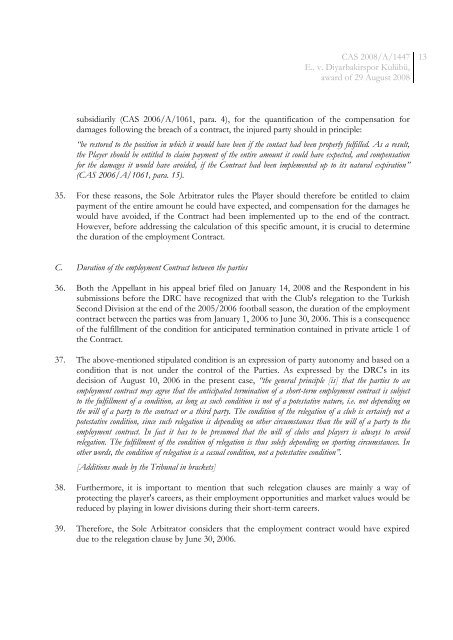2008/A/1447 - Tribunal Arbitral du Sport / TAS
2008/A/1447 - Tribunal Arbitral du Sport / TAS
2008/A/1447 - Tribunal Arbitral du Sport / TAS
You also want an ePaper? Increase the reach of your titles
YUMPU automatically turns print PDFs into web optimized ePapers that Google loves.
CAS <strong>2008</strong>/A/<strong>1447</strong><br />
E.. v. Diyarbakirspor Kulübü,<br />
award of 29 August <strong>2008</strong><br />
13<br />
subsidiarily (CAS 2006/A/1061, para. 4), for the quantification of the compensation for<br />
damages following the breach of a contract, the injured party should in principle:<br />
“be restored to the position in which it would have been if the contact had been properly fulfilled. As a result,<br />
the Player should be entitled to claim payment of the entire amount it could have expected, and compensation<br />
for the damages it would have avoided, if the Contract had been implemented up to its natural expiration”<br />
(CAS 2006/A/1061, para. 15).<br />
35. For these reasons, the Sole Arbitrator rules the Player should therefore be entitled to claim<br />
payment of the entire amount he could have expected, and compensation for the damages he<br />
would have avoided, if the Contract had been implemented up to the end of the contract.<br />
However, before addressing the calculation of this specific amount, it is crucial to determine<br />
the <strong>du</strong>ration of the employment Contract.<br />
C. Duration of the employment Contract between the parties<br />
36. Both the Appellant in his appeal brief filed on January 14, <strong>2008</strong> and the Respondent in his<br />
submissions before the DRC have recognized that with the Club's relegation to the Turkish<br />
Second Division at the end of the 2005/2006 football season, the <strong>du</strong>ration of the employment<br />
contract between the parties was from January 1, 2006 to June 30, 2006. This is a consequence<br />
of the fulfillment of the condition for anticipated termination contained in private article 1 of<br />
the Contract.<br />
37. The above-mentioned stipulated condition is an expression of party autonomy and based on a<br />
condition that is not under the control of the Parties. As expressed by the DRC's in its<br />
decision of August 10, 2006 in the present case, “the general principle [is] that the parties to an<br />
employment contract may agree that the anticipated termination of a short-term employment contract is subject<br />
to the fulfillment of a condition, as long as such condition is not of a potestative nature, i.e. not depending on<br />
the will of a party to the contract or a third party. The condition of the relegation of a club is certainly not a<br />
potestative condition, since such relegation is depending on other circumstances than the will of a party to the<br />
employment contract. In fact it has to be presumed that the will of clubs and players is always to avoid<br />
relegation. The fulfillment of the condition of relegation is thus solely depending on sporting circumstances. In<br />
other words, the condition of relegation is a casual condition, not a potestative condition”.<br />
[Additions made by the <strong>Tribunal</strong> in brackets]<br />
38. Furthermore, it is important to mention that such relegation clauses are mainly a way of<br />
protecting the player's careers, as their employment opportunities and market values would be<br />
re<strong>du</strong>ced by playing in lower divisions <strong>du</strong>ring their short-term careers.<br />
39. Therefore, the Sole Arbitrator considers that the employment contract would have expired<br />
<strong>du</strong>e to the relegation clause by June 30, 2006.

















